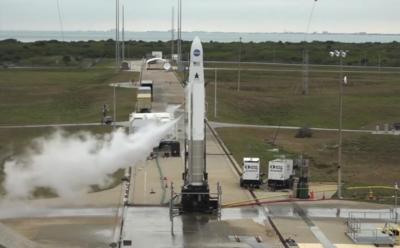Startup Sees First Florida Launch End in Heartbreak and Loss of 4 Satellites
Poseidon is 4 satellites richer following an unsuccessful rocket launch from up and coming space company Astra.

The launch was the first time for the company operating out of Cape Canaveral, Florida, and was expected to be a landmark occasion announcing their entry into the east coast space race. Rocket 3 was carrying 4 satellites from the NASA ELaNa 41 mission on a trip cut far too short. Shortly after the 1st stage disengaged from the rocket, Rocket 3 appeared to fall out of its previous trajectory as the cameras on the ground showed a small dot. From the camera aboard the rocket, the second stage was shown to ignite and almost immediately tumble end over end, recording for a few seconds before cutting out entirely.
The satellites included are, of course, unrecoverable, lost somewhere in the sea. The first of the losses was the Bama-1 cubesat by the University of Alabama, which was testing a drag sail meant to evaluate a deorbit accessory for end-of-life satellite termination. The second was New Mexico State University's Ionospheric Neutron Content Analyzer, a satellite that would have studied the neutron spectrum in low orbit. The third was the Qubesat, from UC Berkeley. It would have tested the effects of space on quantum gyroscopes. Lastly, the R5-S1 satellite from the Johnson Space Center was a cheap technology demonstrator designed to evaluate certain equipment for further use, testing out better hardware, improved transmission capability, and improved software.

Astra has not released their statement yet, and what exactly went wrong remains to be seen. The failure follows another no-go from a week previous, when Rocket 3 scrubbed the second attempted launch only 50 minutes into the short 3-hour launch window. Astra stood down that day, with CEO and founder Chris Kemp saying that "out of an abundance of caution, we are giving the team time to complete a more complete review of the data."
Under the tweet, a plethora of detectives began dissecting every bit of media available from the launch. One noted the on-board camera catching a brief weight shift that they surmise was an unsecured element, either payload or equipment. They noted the shift happening just after the cutoff of the 1st stage, which was then followed by the 2nd stage rotation just before its ignition. Other theories included the possibility of moisture buildup around the explosive bolts caused by the wait time in the humid Florida atmosphere. The explosive bolts being iced over could have led to a failure during stage separation, which would account for the tumble if the rocket was subjected to asymmetric thrust.

Unfortunately for the small startup, failure in all its forms is punished quite harshly by the market. Over the last week, Astra stock tumbled from around $5.29 on February 9th to $3.28 2 days later. The CEO's apology tweet became a battlefield for earnest space enthusiasts accepting the difficulty of making rockets from scratch, and angry day traders smarting from their wounds. "I've now lost $120,000 investing in Astra," said one investor. "I feel they entered the public trading market far too soon and people like me have suffered. I know it's my fault for not understanding spaceflight, so I am not blaming Astra." Others echoed the sentiment, the most unlucky Astra buyers being those who bought in at $19.55 in February 2021. Many remain optimistic, noting the growing pains inherent to every space venture. Ideally, the lessons learned from Rocket 3 will prevent future occurrence of a repeat failure, and Astra seems set on acing the next one.
 Airborne 05.10.24: Icon Auction, Drunk MedEvac Pilot, Bell ALFA
Airborne 05.10.24: Icon Auction, Drunk MedEvac Pilot, Bell ALFA ANN's Daily Aero-Term (05.13.24): ILS PRM Approach
ANN's Daily Aero-Term (05.13.24): ILS PRM Approach ANN's Daily Aero-Linx (05.13.24)
ANN's Daily Aero-Linx (05.13.24) Airborne-NextGen 05.07.24: AI-Piloted F-16, AgEagle, 1st 2 WorldView Sats
Airborne-NextGen 05.07.24: AI-Piloted F-16, AgEagle, 1st 2 WorldView Sats Airborne 05.08.24: Denali Update, Dad-Daughter Gyro, Lake SAIB
Airborne 05.08.24: Denali Update, Dad-Daughter Gyro, Lake SAIB





